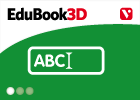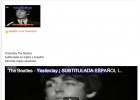Cargando...
Recursos educativos
-
Nivel educativo
-
Competencias
-
Tipología
-
Idioma
-
Tipo de medio
-
Tipo de actividad
-
Destinatarios
-
Tipo de audiencia
-
Creador
Lo más buscado
- Cuentos cortos para dormir preescolar
- Arte bizantino en tercero
- Representación de la Tierra
- Letra ll
- Variación lingüística
- Aprender inglés en sexto
- El valor posicional de las cifras
- Experimentos de anatomía para bachillerato
- Juegos de matemáticas primero
- Actividades de geometría en tercero
- Comunicación animal
- Letras P
- Informática niños
- Lagos de América
- Actividades de geometría
-

Complete. The recovery of the cities
EduBook Organización
- 4566 visitas
Complete the sentences about the growth of the cities: The improvements in stimulated trade and revitalised the . The crops produced by the peasants could be exchanged for other goods. The became places…
-

Video: Yesterday
Educatube Organización
- 3 lo usan
- 6952 visitas
With this song by the Beatles we can study past tenses, "would", and "used to". We can read the subtitles in English and Spanish. Students may discuss if they can relate to the…
-

TEDTalk: A teen just trying to figure it out
Ricardo Tovar Familiar
- 3 lo usan
- 3480 visitas
Fifteen-year-old Tavi Gevinson had a hard time finding strong female, teenage role models -- so she built a space where they could find each other. At TEDxTeen, she illustrates how the conversations on…
-

Introduction - The Hapsburg period
EduBook Organización
- 3939 visitas
During the 16th century, Spain was ruled by the Hapsburg kings, Charles I and Philip II. They built a large and powerful empire with possessions in Europe and the American colonies. However, during the…
-

Hazards caused by human activity
EduBook Organización
- 3956 visitas
3.1. Technological hazards Sometimes, human technology causes problems for the environment. Nuclear power stations are carefully controlled and are generally quite safe, but an accident could cause very…
-

Police and Detectives in the 19th Century
EduBook Organización
- 3614 visitas
In the early part of the nineteenth century there was a lot of crime in London. The city was crowded and criminals could hide easily. It was often not safe to walk down the dark streets. In 1829 Sir…
-

End-of-unit activities - The Hapsburg period
EduBook Organización
- 3876 visitas
During the 16th century, Spain was ruled by the Hapsburg kings, Charles I and Philip II. They built a large and powerful empire with possessions in Europe and the American colonies. However, during the…
-

Final self-evaluation 8.04 - The Great Geographical Discoveries
EduBook Organización
- 3837 visitas
Are the following statements true or false?: From the 15th century, a series of land expeditions took place to open up new trade routes with the West. Christopher Columbus thought that he could get to…
-

Alexander the Great
EduBook Organización
- 3516 visitas
Philip II saw that his son was inflexible and independent. However, he liked to learn and would listen to those that could teach him to reason. So, Philip sent for the most famous philosopher in Greece,…
-

End-of-unit evaluation - The Hapsburg period
EduBook Organización
- 3458 visitas
During the 16th century, Spain was ruled by the Hapsburg kings, Charles I and Philip II. They built a large and powerful empire with possessions in Europe and the American colonies. However, during the…
Te estamos redirigiendo a la ficha del libro...












